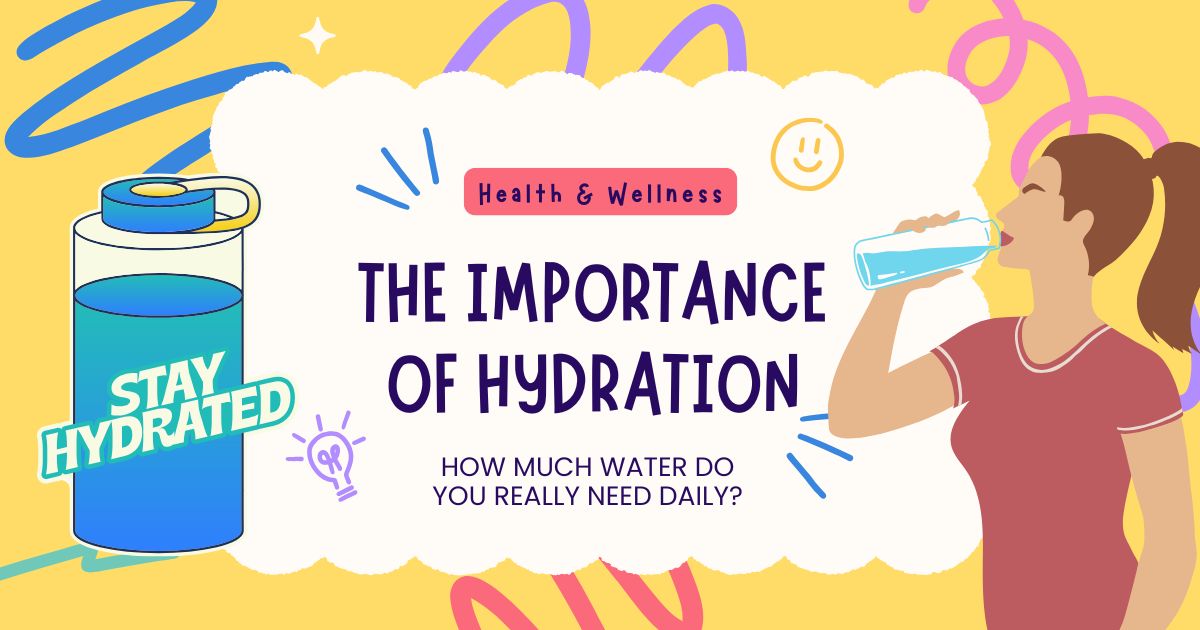Water is the foundation of life. Every cell, tissue, and organ in your body relies on it to function properly. Despite this, many people underestimate the importance of hydration and fail to drink enough water throughout the day. Dehydration, even in mild forms, can affect mood, energy levels, and overall health. But the question remains: how much water do you really need?
In this article, we will explore why hydration is essential, how much water you should drink, and practical tips to ensure you meet your daily hydration needs.
Why Hydration is So Important
Hydration plays a key role in almost every bodily function. Some of the primary reasons water is vital include:
-
Regulating body temperature: Through sweating and breathing, water helps maintain a stable internal temperature.
-
Supporting digestion: Adequate hydration ensures smooth digestion and nutrient absorption.
-
Lubricating joints: Water acts as a cushion for joints, reducing the risk of stiffness and pain.
-
Detoxifying the body: The kidneys rely on water to flush out waste and toxins.
-
Enhancing brain function: Even slight dehydration can impair concentration, memory, and mood.
-
Maintaining skin health: Hydrated skin appears more supple, elastic, and youthful.
Without enough water, the body struggles to perform these essential tasks efficiently, leading to fatigue, headaches, and long-term health risks.
How Much Water Do You Really Need?
There is no one-size-fits-all answer to daily water needs. Factors such as age, weight, activity level, and climate all play a role. However, general guidelines provide a useful starting point.
-
The 8×8 Rule: A common recommendation is to drink eight 8-ounce glasses of water a day, which equals about 2 liters or half a gallon.
-
The Institute of Medicine (IOM): Suggests about 3.7 liters (15.5 cups) per day for men and 2.7 liters (11.5 cups) for women from all fluids, including food.
-
Body Weight Approach: Some experts recommend drinking half your body weight (in pounds) in ounces of water daily. For example, a 160-pound person should aim for 80 ounces (about 2.3 liters) per day.
It’s also important to note that about 20% of daily water intake comes from food—especially fruits and vegetables. The rest comes from beverages, with water being the best choice.
Signs You’re Not Drinking Enough Water
Your body often gives clear signals when it’s dehydrated. Common signs include:
-
Persistent thirst
-
Dark yellow urine
-
Dry mouth and skin
-
Fatigue or low energy
-
Dizziness or lightheadedness
-
Difficulty concentrating
If you frequently experience these symptoms, it may be time to increase your water intake.
Hydration Needs Based on Lifestyle and Environment
Daily water requirements vary depending on your circumstances. Here are a few scenarios where your hydration needs increase:
1. Physical Activity
When you exercise, your body loses fluids through sweat. Drinking water before, during, and after exercise is crucial. Sports drinks may be helpful during intense workouts lasting more than an hour to replenish electrolytes.
2. Climate
Hot, humid, or high-altitude environments increase water loss through sweating and breathing. In such conditions, you may need to drink significantly more than average.
3. Health Conditions
Illnesses like fever, diarrhea, or urinary tract infections increase fluid loss and raise your hydration needs. Certain medications, like diuretics, may also require higher water intake.
4. Pregnancy and Breastfeeding
Women who are pregnant or breastfeeding need extra fluids to support their bodies and their babies. The IOM recommends about 2.4 liters per day during pregnancy and 3.1 liters per day while breastfeeding.
Best Sources of Hydration
While plain water should be your go-to source of hydration, other options contribute as well:
-
Fruits and vegetables: Cucumbers, watermelon, oranges, and strawberries have high water content.
-
Herbal teas: Naturally caffeine-free teas like chamomile or peppermint count toward daily intake.
-
Soups and broths: Hydrating and nutrient-rich, especially in cooler months.
-
Milk and natural juices: Provide hydration along with essential vitamins and minerals.
It’s best to limit sugary sodas and high-caffeine drinks since they can lead to dehydration in excess.
Tips to Stay Hydrated Every Day
Staying hydrated doesn’t have to be difficult. Here are some practical tips:
-
Carry a reusable water bottle: Having water on hand makes it easier to sip throughout the day.
-
Set reminders: Use phone alarms or apps to remind you to drink water regularly.
-
Infuse your water: Add slices of lemon, cucumber, or mint for flavor without extra calories.
-
Drink before meals: A glass of water before eating aids digestion and prevents overeating.
-
Track your intake: Use a hydration app or journal to monitor daily water consumption.
Risks of Overhydration
While rare, drinking excessive amounts of water in a short period can cause hyponatremia—a dangerous condition where sodium levels in the blood drop too low. Symptoms include nausea, confusion, and in severe cases, seizures. Balance is key: aim for adequate hydration without going overboard.
Conclusion
Hydration is far more than just quenching thirst—it is the cornerstone of good health. From boosting brain function to supporting digestion and joint health, water is essential for every aspect of life. While general guidelines like the 8×8 rule provide a baseline, your exact needs depend on factors such as lifestyle, climate, and overall health.
By paying attention to your body’s signals and making hydration a daily priority, you can improve energy, focus, and long-term well-being.
Also Read : Understanding Emotional Intelligence: Importance, Components & Benefits
FAQs
Q1. How can I tell if I’m drinking enough water?
Check your urine color—it should be light yellow. Darker urine is a sign of dehydration.
Q2. Does coffee or tea count toward hydration?
Yes, but in moderation. While caffeinated drinks can hydrate, too much caffeine can have a mild diuretic effect.
Q3. Can I meet my hydration needs through food?
Yes, about 20% of daily hydration comes from foods like fruits and vegetables, but water should remain your main source.
Q4. Is bottled water better than tap water?
Not necessarily. In most places, tap water is safe and just as hydrating. The choice depends on taste and availability.
Q5. What’s the best time to drink water during the day?
It’s best to spread intake throughout the day—drink upon waking, before meals, and during physical activity.



